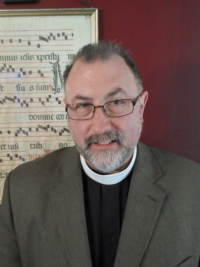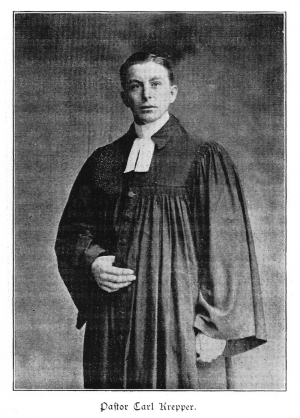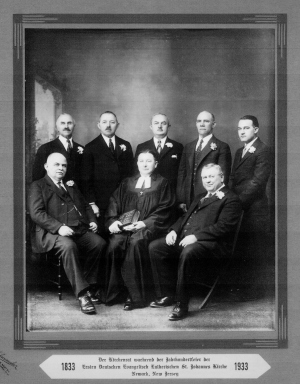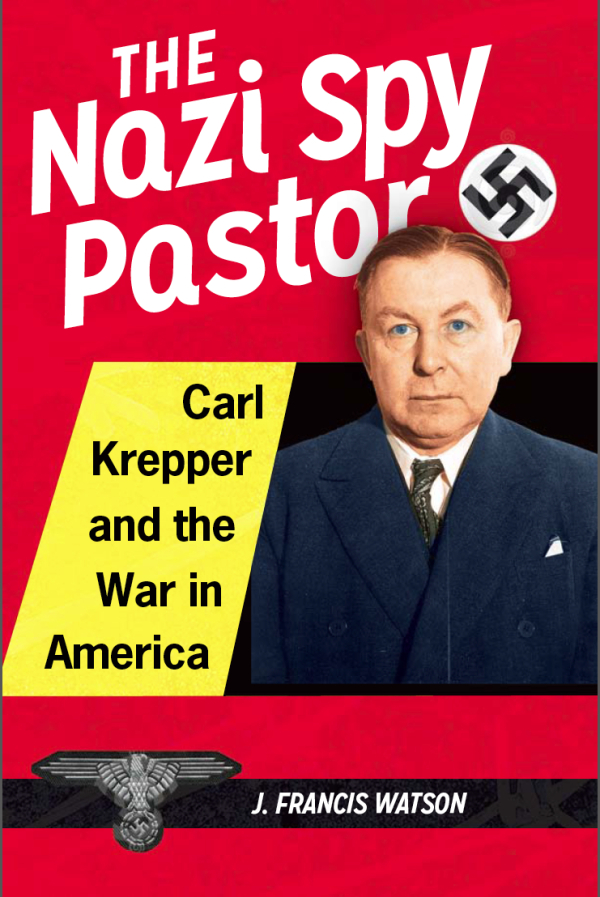 BY COLE NOWLIN They say truth is stranger than fiction, and if there is a more perfect validation of that statement than the story of Carl Krepper, I haven’t come across it yet. Krepper was a Lutheran Pastor turned Nazi spy who found himself embroiled in a plot of subterfuge and sabotage against America during World War II. In his meticulously crafted new book, The Nazi Spy Pastor: Carl Krepper and the War in America (Praeger), local historian and author J. Francis Watson [pictured, below right] details Krepper’s transformation from pastor to secret agent. Watson presents the reader with a vivid and nuanced portrait of Krepper, a man of God whose dangerously misguided religious beliefs collided with militant nationalist ideology. Even more interesting is that is that Krepper was very connected to our very own City of Brotherly Love. He attended the Lutheran Theological Seminary and later became the pastor of Friedens Lutheran Church, both in Philadelphia. The Nazi Spy Pastor has all the elements of a best-selling spy thriller, but has that distinct true-to-life flavor that is impossible for fiction to imitate. Phawker sat down with Frank Watson to talk about this astounding story:
BY COLE NOWLIN They say truth is stranger than fiction, and if there is a more perfect validation of that statement than the story of Carl Krepper, I haven’t come across it yet. Krepper was a Lutheran Pastor turned Nazi spy who found himself embroiled in a plot of subterfuge and sabotage against America during World War II. In his meticulously crafted new book, The Nazi Spy Pastor: Carl Krepper and the War in America (Praeger), local historian and author J. Francis Watson [pictured, below right] details Krepper’s transformation from pastor to secret agent. Watson presents the reader with a vivid and nuanced portrait of Krepper, a man of God whose dangerously misguided religious beliefs collided with militant nationalist ideology. Even more interesting is that is that Krepper was very connected to our very own City of Brotherly Love. He attended the Lutheran Theological Seminary and later became the pastor of Friedens Lutheran Church, both in Philadelphia. The Nazi Spy Pastor has all the elements of a best-selling spy thriller, but has that distinct true-to-life flavor that is impossible for fiction to imitate. Phawker sat down with Frank Watson to talk about this astounding story:
PHAWKER: Who was Carl Krepper? Give us the executive summary.
FRANK WATSON: Carl Krepper was Lutheran Pastor who had traveled from Germany to America before WWI. He ended up becoming very enamored of National Socialism when  Hitler came to power in Germany. While he was an American citizen, he became naturalized, he ended up taking part in some of the early pro-Nazi movements, the Friends of New Germany, the German American Business League, which promoted Nazi principles in the United States. In 1935 he travelled to Germany where he ended up being recruited by the head of the Abwehr, the Nazi military intelligence branch. He came back to America right after the start of WWII, he was on the high seas during the bombing of Pearl Harbor.
Hitler came to power in Germany. While he was an American citizen, he became naturalized, he ended up taking part in some of the early pro-Nazi movements, the Friends of New Germany, the German American Business League, which promoted Nazi principles in the United States. In 1935 he travelled to Germany where he ended up being recruited by the head of the Abwehr, the Nazi military intelligence branch. He came back to America right after the start of WWII, he was on the high seas during the bombing of Pearl Harbor.
PHAWKER: How did you find out about this story, and what inspired you to write a book on Krepper?
FRANK WATSON: What got me started on Krepper and his story was a chance discovery in the Lutheran archives in Philadelphia, where I serve on the board as president and I am also also the archivist for the New Jersey Synod of the Lutheran Church and what I found in those archives was a sealed envelope from a church in northern New Jersey, from the time right after Krepper was arrested. There was one press clipping in there plus records from one of the parishes he had served in New Jersey from Newark. And I thought this was an interesting story, it was a pastor who was arrested for being a Nazi agent. I had never heard of the name before. I looked in some of my standard WWII history books and there was nothing. I thought this was a mystery that drew my attention, it just kind of landed in my lap. So I started digging through other archival sources and old newspapers and I was able to get the basic gist of the story. But it really took until 2012 and the motherlode hit when the FBI released thousands of papers of FBI files for me to look at. I filed a Freedom of Information request and they approved it. It was kind of amazing in a way because I haven’t spoken to too many people who have gotten exactly what they wanted from the FBI. I actually received more than I ever conceived was out there. Then I also started digging further in German Church archives from the time that he was in Germany, and then also the National Lutheran archives in Chicago, because there was more in there than I ever expected as well. He admitted in his church file he was coming to America on a mission from the German government. In that file in Germany there was also the record that his congregation in Germany knew he was a Nazi agent serving in America. It was crazy, I never expected that.
PHAWKER: What was the Pastorius Plot, and what was Krepper’s role in it?
FRANK WATSON: The Pastorius Plot was the landing of eight German agents in two different places. One was in Amaganson, Long Island, four agents arrived by submarine. The others arrived in Florida, and this was in June of 1942. And the plan was that they were going to commit acts of sabotage all over the place, Philadelphia, New York, all the way out to Ohio. They were going to poison the water supply in New York, they planned bombings among other things, it was a really horrible plot. Krepper was sent over here by Walter Kappe, the head of the spy school in Berlin, to be the contact person for these saboteurs. This is even before WWII starts. Before the war started Germany already had plans to sabotage American society, that’s one part of the story people often don’t know about. Walter Kappe had told his saboteurs that Krepper could get messages back to Germany, that he could get any supply they needed for their acts of terrorism, that he could actually get them false identification papers as well. So Krepper had all of these things, plus he had money. And that came, oddly enough, from stamps he had brought into the country illegally, German stamps that were illegal to sell in the United States. He had brought with him thousands of dollars worth of stamps. He was selling them, trading them, and the irony is the Treasury Department wanted to arrest him for that, and when the FBI found that out, they had to step in, and J. Edgar Hoover personally got involved in this and said, ‘stop your investigation, there are bigger fish we are trying to catch.’ And they did, the FBI case was much more serious. Krepper was caught red handed, because the heads of the two sabotage groups had handkerchiefs, with Krepper’s name and address written on them in invisible ink.
PHAWKER: How did Krepper end up getting arrested, what was his fatal mistake?
FRANK WATSON: His biggest slip up was his entanglement with various women. He had three girlfriends. He was cavorting with one of them at Washington’s Rock near  Watchung, NJ, on the day when the saboteurs tried to meet him. The day they were going to try to meet up, he ended up taking his girlfriend out for a romantic stroll, and the saboteurs didn’t meet up with him. And that is one of the reasons that contributed to them all being caught. They lost heart, two of the saboteurs turned on the others, and the FBI dragged them all in. They only let Krepper stay loose because they knew he was a continuing contact for other saboteurs and spies, and they wanted to catch as many as they could so they let Krepper dangle for over two years until they finally arrested him during the Battle of the Bulge.
Watchung, NJ, on the day when the saboteurs tried to meet him. The day they were going to try to meet up, he ended up taking his girlfriend out for a romantic stroll, and the saboteurs didn’t meet up with him. And that is one of the reasons that contributed to them all being caught. They lost heart, two of the saboteurs turned on the others, and the FBI dragged them all in. They only let Krepper stay loose because they knew he was a continuing contact for other saboteurs and spies, and they wanted to catch as many as they could so they let Krepper dangle for over two years until they finally arrested him during the Battle of the Bulge.
PHAWKER: So then Krepper goes to prison?
FRANK WATSON: Yes, he went to Lewisburg Federal Penitentiary in Pennsylvania. He was there with a number of other Nazi agent contacts and Nazi sympathizers and he wasn’t the only pastor who was arrested. He tried to get an exoneration, his one time colleague in Philadelphia had been pardoned by Eisenhower, and he had other German American pastors who also thought Krepper should be pardoned. They had no idea how deeply entrenched in the Pastorius Plot Krepper was, they were kind of gullible. And they created something called the Pastor Krepper Defense Committee. They hired a lawyer who sought to have a pardon granted to Krepper. And what is interesting is that in the FBI and American church records it was clear that if he was exonerated, it would actually implicate Krepper’s family who were innocent, because they received the coded letters from Germany, and lived at the address the saboteurs had, and they probably would have been brought into the case in a way that they weren’t previously. His exoneration request actually went all the way to the Supreme Court, but there was no way he was going to get a pardon. And in America the church refused to give him a pension, he applied for a church pension. The crazy thing is the German church granted him a pension. Also, while he was working as a Nazi agent, he registered with social security, and he was able to retire on a German church pension as well as America social security.
PHAWKER: His master’s thesis topic was very interesting given his Nazi sympathies. Could you comment on that?
FRANK WATSON: I’ve actually read his master’s thesis. Krepper wrote a thesis on American Protestant views on slavery during the American civil war, and he was very critical of American society. I would say it would not pass muster by modern standards, he has no footnotes, there were no citations on a great number of his sources, it was a very poorly written piece. But it was approved and he got his master’s from Rutgers. At the very time he was writing this thesis he founded an organization called the German American Business League that promoted racial segregation, that denied African American and Jews the right to live freely. To join you had to prove you were an Aryan with “no racial admixture.” At the very time he was writing this thesis criticizing American society, which he believed had an improper attitude regarding race during the Civil War, he is promulgating this philosophy that would deny a large part of the American population the freedom of expression, the freedom of religion, all sorts of things. He was a big time hypocrite.
PHAWKER: For me, Krepper immediately brought to mind Charles Coughlin, the infamous anti-Semitic Roman Catholic priest known as the Father of Hate Radio. Was Krepper in  this mold, vocal and vitriolic about his beliefs or was he a low-key spy?
this mold, vocal and vitriolic about his beliefs or was he a low-key spy?
FRANK WATSON: When he was in New Jersey he was very vocal in his support of the Nazis. Again, he founded the German American Business League which promoted the boycott of Jewish stores. He handed out leaflets, he was known publically as a Nazi supporter. What is interesting is that when he went to Germany he had to prove his Nazi bonafides to the church higher-ups, because the church was being co-opted, being brought into the Nazi Regime. He essentially had to be verified as a “Good Nazi.” But this came back to get him, because when he came back to America from Germany, he was denied a parish because the Bishop essentially said “he was too pro-German, too pro-Nazi at a time when we are at war with Germany.” And he helped the FBI find Krepper. And for me, as a churchman, as a Lutheran Pastor as well, I say thank God our leadership did the right thing, and helped the FBI catch this Nazi agent.
PHAWKER: The book ends with a quote from Franklin Frey, who said of Krepper, “God and the Reich were closely identified in his mind.” How did that happen, how did a priest, of all people, end up with such a notion?
FRANK WATSON: It’s mind boggling to me, too. But Krepper had this romantic ideal of Germany, the Germany that he grew up with and he left. When he left Germany in 1909, Germany was an empire. And when he went back to visit, he saw Germany go from an empire to a republic. It had lost its territory, lost its prestige, it went into a downward economic spiral. The Germany he loved was gone. When he was arrested, TIME magazine gave an account of Krepper’s arrest, and they noted his bookshelves were filled with German Romantic novels. He thought of himself as a Lothario, he had all these women, and they were all widowers, and they all had money and one of them had multiple rooming houses in New York. And there is an episode referred to in his FBI file where he is walking down the street with one girlfriend, he told her to wait on the corner, and then he ran down a couple blocks to the house of another girlfriend. And the FBI agents following him are thinking, what is this, he is seeing one girlfriend and has another waiting on him to return? And they realized this was part of his problem, he had this image of himself as the quintessential “dashing spy” when he was more of a buffoon. The one bit in the FBI file about him running through Central Park looking over his shoulder, trying to dodge counter spies and such, he didn’t realize he had been under surveillance for months at that point.
PHAWKER: To what extent, if any, do you think Krepper was aware of the Holocaust, and the atrocities that were happening back in Germany, do you think he knew anything more than the average newspaper reader?
FRANK WATSON: He thought that people in America were stupid, he thought our sense of democracy was very poorly timed and ill conceived, and what he knew of our society was twisted and demented really, but the other part of it was his conception of Germany was more idealistic than real. I don’t think there was any way he couldn’t have known about some of the realities going on there, because he was there in 1941, and certainly concentration camps were in existence there. It is a reality that I think many Germans could not have ignored. All of his references to Jewish people were negative.The irony is that when he came back to America and tried to get his parish back, the pastor there was part Jewish! That pastor knew he could never get a church in Germany, so he went to America and the church he got assigned was Krepper’s old church. It was the perfect irony.
For more on this fascinating story, you can buy Watson’s book HERE.

